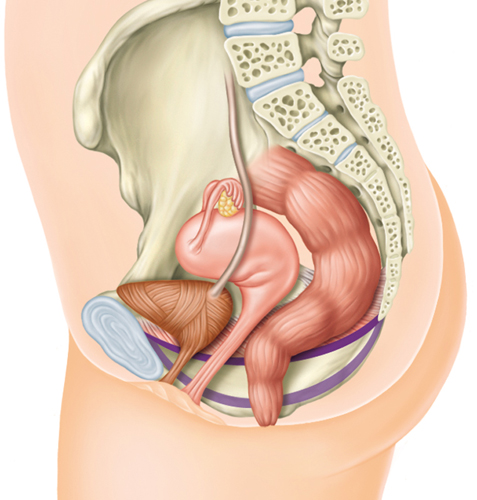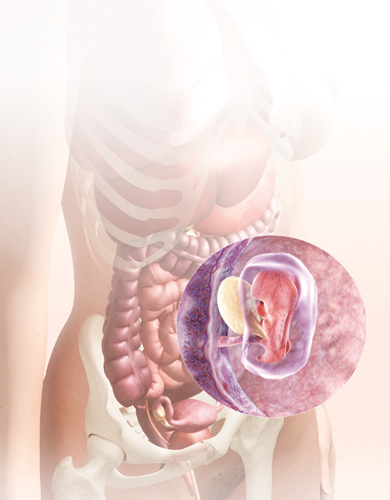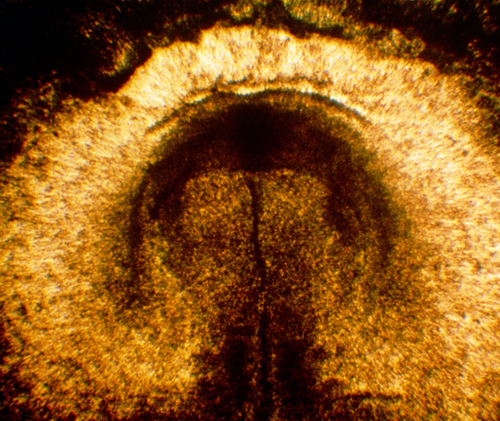You are 4 Weeks Exactly 252 days to go…
Are you feeling irritable and tired, and are your breasts tender? Well, you might just be pregnant!
Your baby today
This highly magnetized image shows that the embryo consists of
two layers of cells—those of the upper, darker layer are more
rectangular in shape and lie on the side of the amniotic cavity, and
those on the lower layer lie on the side of the yolk sac.

Nature has a strange way of working.
You might feel low if you have your usual PMS symptoms and think it
means that you haven’t conceived, but in fact, there are many
similarities between the symptoms of premenstrual syndrome (PMS) and
those of early pregnancy. This is because the hormones that cause PMS
are raised in pregnancy and so can cause the same symptoms. In addition
to this, you might be irritable and emotional even without having PMS,
just due to the anxiety of wanting to be pregnant and waiting to see
whether or not your period arrives.
While you are in the
middle of this storm of hormones and raging emotions it can be difficult
to remain calm. Talk to your partner about your emotions and
anxieties—just expressing that you’re finding things stressful can help
you get through this tense time. Alternatively, confide in a female
relative or friend, who might be able to relate to how you’re feeling.
Frustratingly, at this
point it is still a waiting game; all you can do is try to be patient
until you take your pregnancy test. If your period was due today—day 28
of your cycle—and hasn’t made an appearance, you can take a test as
early as today or tomorrow. Good luck!
… Your body
Start squeezing!
It’s never too early to start Kegel exercises
and you’ll be glad you did once you become pregnant. The pelvic floor
is a broad sling of muscles that stretches between your legs and extends
from the pubic bone in front to the spine at the rear. It holds and
supports your bladder, uterus, and bowel in place and controls the
muscles which hold closed the anus, urethra, and vagina.

Try these simple steps to tone your pelvic floor:
First
try to locate your pelvic floor: sit on a chair and close your eyes—now
visualize the sling of muscles stretching right across your body
holding your uterus and bladder.
Next
contract your pelvic floor muscles pulling inward and upward, hold for a
count of five, then release. Repeat this exercise at least 10 times a
day.
Test:
if you’re having trouble identifying the muscles, imagine that you are
trying to stop the flow of urine; the muscles you feel contracting are
those of the pelvic floor.
Your 5th Week
When your pregnancy is
confirmed, it’s natural to experience a mixed bag of
emotions—excitement, disbelief, joy, and anxiety. Everything is about to
change forever for you and your partner. Give yourselves time to take
in the big news. You may not feel pregnant yet, but momentous changes
are taking place in the hidden world of your uterus. Step by step, the
building blocks of life are being set in place.
NOTE
If you have no period and a positive test result, you’re going to have a baby!
Embryo at 5 weeks

You are 4 Weeks and 1 Day 251 days to go…
The waiting is over. If your period hasn’t started, take a home pregnancy test to find out whether you’ve conceived.
Your baby today
This is a microscope view of the amniotic cavity with the cells
that will become the baby in a close-up. These cells will repeatedly
divide and multiply, becoming more and more specialized at each stage of
their development.

If you’ve missed your period
(assuming that your normal cycle is no more than 28 days and that your
period is therefore late), you may want to do a home pregnancy test
today.
A home pregnancy
test, available at pharmacists and most supermarkets, contains a
chemical that reacts if your urine contains the hormone hCG (human
chorionic gonadotrophin). This is produced by an implanting embryo and
will be found in your urine if you are pregnant. Levels of hCG are
likely to be over 50 mIU/ml on the day your period is due. With between
97 and 99 percent accuracy, the majority of over-the-counter tests are
sensitive enough to detect this amount, so they can be used on the first
day of your missed period; some can be used earlier (see You are 3 Weeks and 1 Day).
The tests only turn
positive once there is a certain level of the hCG hormone present in
your urine: if you test too early, the result might be negative even
though you are pregnant. Therefore, if you don’t get your period but you
had a negative result, test again after two to three days. If you are
pregnant, the levels of hCG will have risen, giving a positive result.
If you get a positive result but your period starts anyway, it may be that you have suffered a very early miscarriage.
You can find out within minutes
whether you are expecting a baby, but as you await this life-changing
result it can seem like a lifetime for the symbol to appear.

How to use a home pregnancy test
Always read the instructions, but most tests work as follows:
You urinate on the stick and leave it for a specified number of minutes.
A symbol will appear
in the control window to indicate the test is working (if this does not
appear, the test is faulty). If a symbol then appears in the results
window, you are pregnant.
It is advisable to do the test
first thing in the morning when your urine is most concentrated. By
doing this, the hCG levels are likely to be detected more easily
The results symbol
gradually fades, so read it after the specified time, not later. Do
another test the next morning if you’re unsure of the result.
You are 4 Weeks and 2 Days 250 days to go…
In this third week since conception, the cells that will become the embryo move to form the basis of the central nervous system.
Your baby today
The embryo until this stage of development has consisted of two
layers of cells. Now, a third layer starts to become visible as a
“bulge” between the two—this bulge can be seen in the center of this
image.

While you’re busy coming to terms with being pregnant,
there are incredible changes taking place inside you. The group of
cells, that will become your baby is currently shaped as a flat disk and
undergoing significant development. A narrow groove begins to form down
the middle of the cells. The leading edge of the groove is slightly
wider forming a circular “node.” The outer edges of the node and groove
are slightly raised. The cells move from the rolled edges of these
structures downward into the groove to lie between the original two
layers of cells. This creates three layers of cells, those on each outer
disk surface and those sandwiched between them. The node and groove do
not extend along the entire length of the disk.
At the head end, a
separate groove forms. Called the neural groove, this ultimately forms
the brain and spinal cord (the central nervous system). In four days
time, the disk will lengthen and widen at the end that will form your
baby’s head. In six days time, the neural groove has folds on either
side that will later meet to form the neural tube.
Shown here is the neural tube of an embryo
in the early stages of pregnancy. The brain and spinal cord will
develop from the neural tube. If the tube does not fully close, it can
lead to birth defects, most commonly spina bifida.

… Doctor
| Q: |
I’ve been having difficulty getting pregnant and have now been diagnosed with polycystic ovary syndrome. What is this?
|
| A: |
This condition causes the ovaries to be bigger than normal and
they produce a large number of small follicles that never grow to full
maturity. Therefore an egg is not released to be fertilized and periods
are very irregular
The condition is a
common cause of fertility problems and treatments are aimed at
stimulating ovulation and also reducing some of the symptoms, such as
increased body hair. Polycystic ovary syndrome appears to run in
families.
|
… Relationships
“You’re going to be a dad!”
It’s the positive result you’ve been waiting for—hopefully!—but
how do you share it with your partner? You could present him with an
envelope containing your positive pregnancy test, or explain that you
have a “special gift” for him but it won’t be ready until about, oh,
nine months. It shouldn’t take him long to figure it out! Ideally,
choose a time when you are both alone and feeling relaxed so that it can
be a special moment. You may want to do another test with your partner
just to make sure and also so that he feels involved.
Even if you’re excited,
and even if you can’t get in touch with your partner for a day, don’t be
tempted to tell your mom and close friends first Your partner may be
upset, understandably, if others know he’s going to be a dad before he
does.